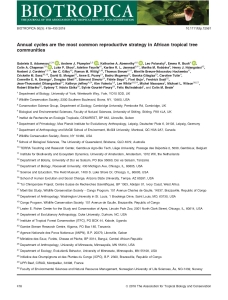Adamescu G.S., Plumptre A.J., Abernethy K.A., Polansky L., Bush E.R., Chapman C.A., Shoo L.P., Fayolle A., Janmaat K.R.L., Robbins M.M., Ndangalasi H.J., Cordeiro N.J., Gilby I.C., Wittig R.M., Breuer T., Breuer-Ndoundou Hockemba M., Sanz C.M., Morgan D.B., Pusey A.E., MugerwaB., GilagizaB., Tutin C., Ewango C., Sheil D., Dimoto E., Baya F., Bujo F., Ssali J.T., Jeffery K., Valenta K., White L., Masozera M., Wilson M.L., Bitariho R., Ebika S.T.N., Gourlet-Fleury S., Mulindahabi F, Beale C.M.
We present the first cross-continental comparison of the flowering and fruiting phenology of tropical forests across Africa. Flowering events of 5446 trees from 196 species across 12 sites and fruiting events of 4595 trees from 191 species across 11 sites were monitored over periods of 6 to 29 years and analyzed to describe phenology at the continental level. To study phenology, we used Fourier analysis to identify the dominant cycles of flowering and fruiting for each individual tree and we identified the time of year African trees bloom and bear fruit and their relationship to local seasonality. Reproductive strategies were diverse, and no single regular cycle was found in >50% of individuals across all 12 sites. Additionally, we found annual flowering and fruiting cycles to be the most common. Sub-annual cycles were the next most common for flowering, whereas supra-annual patterns were the next most common for fruiting. We also identify variation in different subsets of species, with species exhibiting mainly annual cycles most common in West and West Central African
tropical forests, while more species at sites in East Central and East African forests showed cycles ranging from sub-annual to supra-annual. Despite many trees showing strong seasonality, at most sites some flowering and fruiting occurred all year round. Environmental factors with annual cycles are likely to be important drivers of seasonal periodicity in trees across Africa, but proximate triggers are unlikely to be constant across the continent.
Consultez la notice complète de l’article sur ORBi

